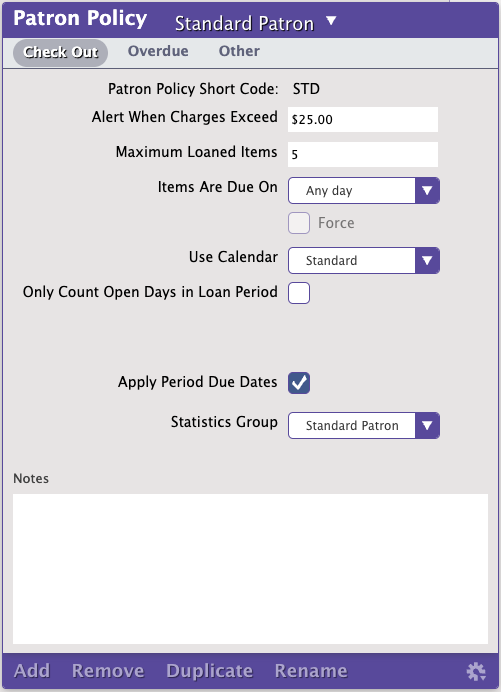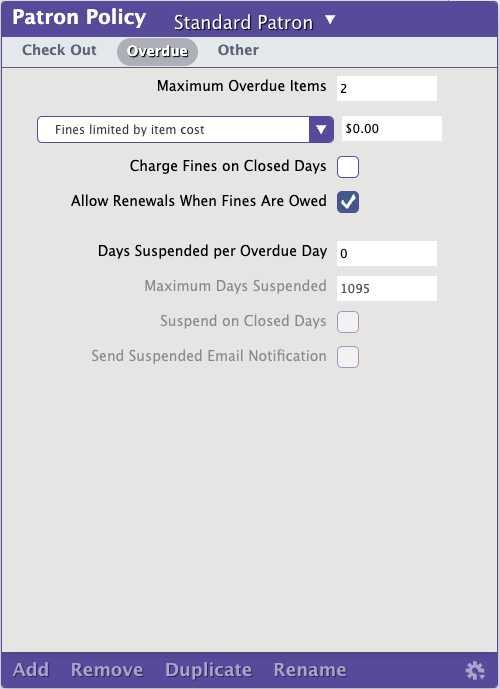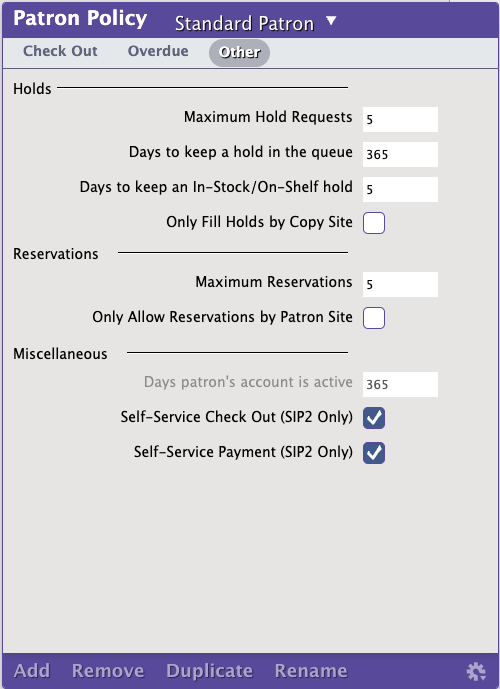- Created by Ashley, last modified by Myra on Apr 03, 2024
this page has been moved to https://support.goalexandria.com/tools/policies/
Patron Policies
Any time the rules differ for a patron group you will need to create a new patron policy and assign it to the affected patrons. Policies are required for every patron and every item (or item copy). Policies are used to give detailed statistics for patrons and/or items for a specific time frame. Policies are also a selection in almost every patron, item, and circulation report.
Step-by-Step Instructions
Create a New Patron Policy
If you are convinced that more detailed Patron policies are the way to go, here are the steps to follow to add a patron policy:
- Go to Preferences > Policies.
- At the bottom of the Patron Policy pane, click Add.
- In the Add Policy dialog, enter the Policy Name and Policy Short Code and select an optional Statistics Group.
- From the Defaults dropdown menu, select which policy to duplicate values from.
- Click Add.
- Next, tab through the various Policies (Check Out, Overdue, and Other) providing appropriate values to the fields, dropdown menus, and checkboxes in order to create your policy.
- When you have completed your new policy, click the Save button.
- Repeat this process until you have made all your new patron policies.
Many school libraries and public libraries create policies based on their patron's age and/or grade. Alexandria does not automatically change or set any patron policies just because a policy matches their age and/or grade. An operator (e.g. librarian) must set the patron's policy either using patron imports or manually in Patrons Management.
Modify a Patron Policy
- Go to Preferences > Policies.
- Next, select the patron policy to be modified from the Patron Policy dropdown menu (left-hand side of the window).
- Make the appropriate changes to the value(s) in the Patron Policy fields, dropdown menus, and checkboxes.
- When you have finished modifying the Patron Policy, click the Save button to keep your changes; otherwise, click Revert to discard them
Modifying a Patron Policy will not affect past transactions. For example, the only way to change the fine rate on a book that is currently checked out is to check the book in, forgive the fine, and then check the book back out to the same patron for the original due date (using a manual override date).
Note you can run the Change Patron Policies utilities to change multiple patrons at once.
Duplicate a Patron Policy
Duplicate a patron policy when the policy values are exactly the same as or there are only minor variations from an existing patron policy.
- Go to Preferences > Policies.
- Click Duplicate
- Enter the new Patron Policy Name and Patron Policy Short, and select an optional Statistics Group in the fields provided.
- Click Add.
- Make the appropriate changes to the value(s) in the Patron Policy fields, dropdown menus, and checkboxes.
- When you have finished modifying your duplicated Patron Policy, click the Save button to keep your changes; otherwise, click Revert to discard them.
- Repeat this process until you have finished making all your new patron policies.
Remove a Patron Policy
In older versions of Alexandria, a policy could not be removed if it was still in use. However, that is no longer necessary. When a patron policy is removed, you'll be prompted to choose a replacement policy for the impacted patrons.
- Go to Preferences > Policies.
- Select the policy that you would like to remove from the Patron Policy dropdown menu.
- Click Remove in the lower-left hand side of the Patron Policy section.
- If the policy you're removing is still in use, click the dropdown menu to choose a replacement policy for the impacted patrons.
- Click Schedule Removal.
Standard and System policies cannot be removed. They are required by Alexandria in order to function at all times.
Assign a Patron Policy to an Individual
- Go to Patron Management.
- Find the patron whose policy you want to change.
- Unlock the record.
- Click on the Policy dropdown menu (the first dropdown menu at the top left of the window).
- Select the policy for this patron.
- Click Save at the top-right of the window.
Check Out

Settings
Patron Policy Short Code
This is the patron Policy Short Code you provided when adding the patron policy; for example, if the Policy Name is “3rd Grade”, you might provide “3GR” as the Policy Short Code name. Look for this patron Policy Short Code on reports such as the Super Summary for statistics on items checked out to patrons of this policy.
Alert When Fines Exceed
The total fine amount that a patron (under this policy) can accrue before circulation privileges are denied and an alert window appears during checkout. If the patron's total fines exceed this value, an alert will appear when this patron becomes the Current Patron. If you want an alert for any patron with fines, set this value to “$00.01”. If you want alerts for patrons with larger fines, determine that value here. An operator with the appropriate security level can override the resulting alert window and allow checkout regardless.
Maximum Loaned Items
The maximum number of items that the patron type (under this policy) can check out before circulation privileges are denied. COMPanion recommends not setting this number above 50. However, this number corresponds directly to and is determined by the power of your computer system. An operator with the appropriate security level can override the resulting alert window and allow checkout regardless.
Items Are Due On
If you select a day of the week from this drop-down menu, all loaned items are due back (for patrons under this policy) that same day each week. You can choose between Any day (meaning item due dates are based on the Number of days these items can be loaned option) or Monday through Sunday. If the day of the week you select happens to fall on a Closed day, then Alexandria will try the specified due on date again in a week. If next week's due on date also happens to be Closed, Alexandria will make the item due on the next available Open date. For example, if a library requires that certain items are due back on Fridays—setting this preference to Friday allows due dates would be calculated for the specified circulation period and then advanced to the next open Friday.
Force
If a due on date falls on a Closed day, this checkbox forces the item to be due on the next open day specified in the Items are due on drop-down menu described above. Therefore, if a due on date is Thursday, items will always be due on a Thursday.
Use Calendar
This drop-down menu selects the calendar used when calculating due dates (under this policy). Items are never due on Closed Days and circulation periods may be shortened by the Period Due dates specified on the calendar chosen—if period due dates apply. If you remove a calendar that is being used by a policy, the Standard calendar automatically replaces it. All changes made (closed dates, period due dates, etc.) will be generated by Alexandria using this specific calendar.
Only Count Open Days in Loan Period
Check this box if you want the grace period to only count open days (i.e. only open days are used in determining the grace period before an overdue fine is charged). For example, if a patron returns an item after hours on the last of his grace days, fines will begin to accrue the following day, regardless if this day is Closed (e.g. a holiday or weekend) or not. In other words, this option keeps grace days from being used to cover days when the patron cannot return an item.
Apply Period Due Dates
Set up a Period Due date in the Calendars Preference window (by clicking twice on an empty calendar day). Period Due dates are fixed due dates that require items to be returned to the library, regardless of the loan period or any other circumstances. You may have as many Period Due dates as you require for your library. If you choose to apply period due dates to patrons under this policy, due dates for items are automatically adjusted during checkout. This allows items to circulate for their normal circulation period until the circulation period would extend past any period due date specified in the designated calendar. If period due dates apply, the circulation period is shortened and the due date is set to the period due in the specified calendar.
This feature is immensely useful for libraries that require all books returned in order to perform an inventory or move the collection.
Statistics Group
Provides an alternate statistic and/or way to track groups of patron policies; for example, when policies are created, the Statistics Group option (e.g. 7th Grade) can be applied and later reported or searched.
Overdue

Settings
Maximum Overdue Items
The maximum number of items (under this policy) that patrons can have overdue before circulation privileges (i.e. new item check out) are denied. An operator with the appropriate security level can override the resulting alert window and allow checkout regardless.
Maximum Fine for an Overdue Item
This value limits the total amount (the maximum fine) that can be charged for an overdue item before it no longer accrues fees. One example would be if a patron had three overdue items; if this policy was set to $5.00, the patron would not exceed $15.00 in overdue fines for just these three books. If you want to allow unlimited fines, enter a large value here. If this option is selected and set to $0.00, patrons in this policy will not accrue overdue fines.
Fines Limited by Replacement Cost, PLUS
When this option is selected, a fine for a particular item is limited to its Replacement Cost (if available), Purchase Cost (if available), or the deault (average) policy value (if available). Otherwise, an item's “value” is set at $20.00. If you don't set this, fines can exceed the cost of the item, even if the Maximum fine for an overdue item preference is set to more than the cost of the item. The PLUS part adjusts the Fines Limited by Item Cost option above to include an additional dollar amount. For example, if your Fines Limited by Item Cost was set to $20.00 and the Plus was set to $5.00, the fine would be limited to $25.00 (i.e. Fines Limited by Item Cost + $X.XX).
Charge Fines on Closed Days
When checked, a patron will be charged the fine rate for every day each item is overdue, even on library closed dates (e.g. weekends and holidays), excluding grace days. When left unchecked, a patron will only be charged for days the book is overdue when the library is open, excluding grace days.
Allow Renewals When Fines Are Owed
If this box isn't checked, patrons will be unable to renew any items that they have checked out until their fines are paid.
Days Suspended per Overdue Day
Enter the number of days that a patron's library (i.e. circulation) privileges should be suspended per overdue day. For example, if the value in this field is set as 2, then for each day an item is overdue, the patron will have circulation privileges suspended for two days. If the item were three days late, privileges would be suspended for six days, beginning with the first overdue day. Note that the dialogue box in Circulation regarding this policy will NOT suspend the patron if you select "Cancel."
Maximum Days Suspended
The maximum number of days that a patron can be suspended. This is only active if Days Suspended per Overdue Day is greater than zero.
Suspend on Closed Days
If a patron has been suspended for overdue items, the suspension will count Closed Days (i.e. days that the library is closed) as part of the suspension time if this option is checked. This is only active if the Days Suspended per Overdue Day value is set to anything greater than zero.
Send Suspended Email Notification
If this option is checked, an email notification will be sent to the patron if a suspension is incurred. This is only active if Days Suspended per Overdue Day value is greater than zero and the library email address has been set, the library STMP server has been set, and email notification is enabled.
Run a Suspended Patrons report to see all suspended patrons.
Other

Holds
Maximum Hold Requests
This is the maximum number of pending hold requests that patrons (under this policy) can have active at any one time before additional holds are denied. An operator with the appropriate security level can override the resulting alert window and allow checkout regardless.
Days to keep a hold request in the queue
The number of days a patron's hold request will stay active (i.e. how long Alexandria keeps a pending hold). Hold requests that exceed this given time limit (e.g. no copies of the title were returned) are automatically removed from the system.
Days to keep an In-Stock/On-Shelf hold
Once a copy is returned and fills a requested hold, it will be reserved for this many days for the patron to pick up (i.e. the number of days a patron's in-stock hold will be kept). In-stock hold requests that expire (e.g. when a patron doesn't pick up the copy during this time) are automatically removed at the beginning of each day; a notice is prepared so that items may be returned to an available status, returned to the shelves, or held for another patron in the hold queue. This setting also applies to on-shelf holds.
Only Fill Holds by Copy Site
If checked (in a Centralized Catalog environment), patrons may only place holds on items from their local library / school collection. An alarm will sound and a warning message will appear if an attempt is made to place a hold on an item from another library (i.e. items with a different library identification).
Reservations
Maximum Reservations
This is the maximum number of reservations that a patron is allowed (under this policy).
Only Allow Reservations by Copy Site
If checked (in a Centralized Catalog environment), patrons may only place reservations on items from their local library / school collection. An alarm will sound and a warning message will appear if an attempt is made to place an item from another library (i.e. items with a different library identification) on reserve.
Miscellaneous
Days patron's account is active
This value is used as the default account expiration date for newly added patrons (i.e. how long, in days, that patron's account is valid). Usually, this is one year. When an account is expired, an alert will appear on the Circulation window when that patron is accessed or attempts to check an item out. (If account expiration is disabled, this field is also disabled.)
If a patron has been assigned one policy, and later has that policy changed to one with a different number of days the account is active, the expiration date of the patron will not automatically change. If you do not want to renew accounts, set this to a very high number.
Self-Service Check Out (SIP2 Only)
When checked, SIP2 self-service check out will be allowed for this patron group. Default is checked.
Self-Service Payment (SIP2 Only)
When checked, patrons are allowed to make self-service payments at SIP2 stations. If this is unsupported by your SIP2 hardware, then this field is ignored.


